
|
![]()
Greatest Films of the 1980s
1980 | 1981 | 1982 | 1983 | 1984 | 1985 | 1986 | 1987 | 1988 | 1989
Title Screen Film Genre(s), Title, Year, (Country), Length, Director, Description 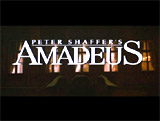



Amadeus (1984), 158 minutes, D: Milos Forman
Milos Forman's stunning, opulent, Best Picture-winning biography (not always 100% accurate, however) of musical prodigy Wolfgang Amadeus Mozart, based on the Broadway play by Peter Shaffer (whose screenplay adaptation won him an Oscar), is perhaps his grandest production - equaling his earlier Best Picture winner One Flew Over the Cuckoo's Nest (1975) and only challenged by The People vs. Larry Flynt (1996). The film focuses on the character of the official royal composer Antonio Salieri (1750-1825) (F. Murray Abraham in an Oscar-winning performance) for Austrian Emperor Joseph II (Jeffrey Jones), and the story of his envious loathing, yet reverential relationship to the great prodigy Mozart (Tom Hulce), who is simultaneously spoiled, vulgar and talented. Told in flashback, the mediocre Salieri is slowly driven insane as he recognizes Mozart's incredible musical genius, but is tormented and consumed with insecurity and jealousy. The film was well-received by both critics and audiences alike with its lavish set and period costume design (filmed on location in Prague), its accessibility and nonpretentiousness, and its sly intelligence and musings over the capricious nature of "God-given" talent.


Beverly Hills Cop (1984), 105 minutes, D: Martin Brest
See Beverly Hills Cop series.
The fish-out-of-water comedy starred Eddie Murphy as fast-talking, smart-mouthed Axel Foley. He was an undercover Detroit police detective who engaged in a relentless pursuit from his hometown to the city of Los Angeles. Foley was searching for the killers of his old "hoodlum friend" and ex-crime partner "Mikey" Tandino (James Russo). The street-smart, reckless cop was continually at odds with the Beverly Hills police department as he brought the killers to justice. Unknown Brooklyn comic Eddie Murphy, initially on TV's Saturday Night Live, found his greatest stardom with this series - and this film was his highest-grossing live-action movie. The film was the biggest box-office hit of the year (at $234 million), barely edging out Ghostbusters (1984) at $229 million (domestic).



Blood Simple (1984), 97 minutes, D: Joel Coen





The Bounty (1984, US/UK), 130 minutes, D: Roger Donaldson




Choose Me (1984), 106 minutes, D: Alan Rudolph

Dangerous Moves (1984, Switz./Fr.) (aka La Diagonale du Fou), 100 minutes, D: Richard Dembo
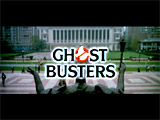


Ghost Busters (1984), 107 minutes, D: Ivan Reitman

The Home and the World (1984, India) (aka Ghare-Baire), 140 minutes, D: Satyajit Ray




The Killing Fields (1984, UK), 141 minutes, D: Roland Joffe


The Natural (1984), 134 minutes, D: Barry Levinson
Director Barry Levinson's allegorical and mythical fairy tale film about baseball was based on Bernard Malamud's 1952 story, with a soaring score by Randy Newman. It featured Robert Redford as Roy Hobbs - a "naturally"-gifted baseball-playing prodigy whose life and sports career were sidetracked when he was shot by a mysterious, disturbed woman. 16 years later, he made a miraculous comeback and led his New York Knights team to the World Series. So many magical elements came together to create this romanticized film - a Babe Ruth-like slugger named "The Whammer" (Joe Don Baker), Hobbs' unexplained silver-bullet shooting, and a legendary "Wonderboy" bat (with a lightning bolt inscribed on it and carved out of a tree struck by lightning - reminiscent of Excalibur in the heroic King Arthur knights tales). The film concluded with the fulfillment of Roy's heroic quest - and his reunion with a pure "lady in the white dress" who had repeatedly inspired him and watched him from the stands. She was his childhood sweetheart and naive ex-girlfriend Iris Gaines (Glenn Close), with whom he had unknowingly produced an out-of-wedlock child.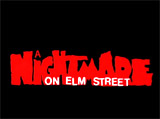

A Nightmare on Elm Street (1984), 91 minutes, D: Wes Craven
See series of A Nightmare on Elm Street films.
Craven's horror film single-handedly revived the teens-in-terror slasher flick sub-genre, and ultimately became a major franchise. It revealed his intellectual fascination with the subconscious, multi-layered psychic worlds, dreams and nightmares. He created one of the most well-known horror characters - the sexually-deviant, reincarnated, sadistic, hideously-grotesque child killer Freddy Krueger. The premise of the series was that the children of Freddy's past persecutors - now grown-up teens (who were at odds with their parents) - who fell asleep would experience Freddy's haunting and returning presence from Hell. The film elevated the prototypical slasher film into an inventive story about the intersection of surreal nightmare worlds and the real world (e.g., a geyser of blood pouring from a victim's bed). For a showdown with Freddy, smart and resourceful teen heroine (Heather Langenkamp) decided to play by 'dream rules' and tricked the dream demon into entering her reality so she could defeat him on her own turf.


Once Upon a Time in America (1984, It./US), 227 minutes, D: Sergio Leone
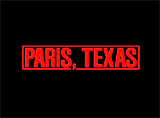


Paris, Texas (1984, UK/Fr./W. Germ.), 147 minutes, D: Wim Wenders



A Passage to India (1984, UK), 163 minutes, D: David Lean


Places in the Heart (1984), 112 minutes, D: Robert Benton



Romancing the Stone (1984), 105 minutes, D: Robert Zemeckis





A Soldier's Story (1984), 101 minutes, D: Norman Jewison
This well-crafted drama that examined racial hatred was set in 1944 (during World War II) at Fort Neal, a segregated Southern military post and base for black platoons. In the shocking opening, hated tyrannical black drill instructor Master Sergeant Vernon Waters (Adolph Caesar) was found shot to death (with a .45 caliber pistol) outside the base on a road in the town of Tynen, Louisiana. During the investigation (told through various interrogations and flashbacks) by tough, serious African-American attorney Captain Davenport (Howard E. Rollins) brought down from Washington, DC, it was at first thought that the drunken Waters was killed by white officers or the Ku Klux Klan, but they were quickly ruled out. Davenport faced many obstacles in his investigation: deceit, prejudice, lack of cooperation, a resistant chain of command, and black troops who were afraid to talk. Commanding officer Colonel Nivins (Trey Wilson) limited Davenport's official inquiry to only three days. Many of those questioned, including a number of fellow soldiers (black and white), had a motive to kill Waters. Davenport discovered that the unpopular Waters had denounced illiterate, guitar-strumming "Geechee" C. J. Memphis (Larry Riley) as a shameful example of the black race: "The Black race can't afford you no more. There used to be a time, we'd see someone like you singin', clownin', yassuh-bossin'... and we wouldn't do anything. Folks liked that. You were good. Homey kind of nigger. When they needed somebody to mistreat, call a name or two, they paraded you. Reminded them of the good old days. Not no more. The day of the Geechee is gone, boy. And you're going with it." Waters had brought trumped-up charges against Memphis, who was later driven to suicide (by hanging) in his cell while awaiting trial. Davenport also learned that only MPs and soldiers on special duty were given .45 ammunition. It was revealed that Waters was killed by unrepentant and militant Pvt. First Class Peterson (Denzel Washington) who explained that he killed Waters in revenge for driving C.J. Memphis to suicide. Peterson confessed: "I didn't kill much. Some things need gettin' rid of. Man like Waters never did nobody no good, Cap'n."

Stranger Than Paradise (1984, US/W. Germ.), 89 minutes, D: Jim Jarmusch
Jim Jarmusch's minimalist, odd-ball, stark B/W indie road film - his breakthrough film - was only his second feature. The influential, low-budget, deadpan comedy mixed the feel of a Jack Kerouac road film, a Waiting for Godot-like script written by Samuel Beckett, post-beatnik hipster 'coolness', and the glacial pace of an Andy Warhol movie. It followed the aimless, slacker and boring lifestyle of small-time gambler Willie (John Lurie) and his misfit hustler buddy Eddie (Richard Edson) in three settings or locations, which delineated the three-part film: NY, Cleveland, and Miami. They were on a disaffected, pointless, and low-key search for some kind of paradise. After Willie spent 10 days with his teenaged Eva (Eszter Balint), a distant Hungarian cousin who impressed him by shoplifting, he and Eddie visited her a year later in Ohio during a stark winter, and she joined them for an off-kilter trek to the tacky world of Miami where the film ended in a bizarre fashion as they parted ways. Although essentially plotless (but providing a timeless, insightful snapshot of the 80s), the film's main stylistic message was the aimless, uncommunicative, boring, and listless goals of its main characters who nevertheless formed a compelling, tight affectionate bond with each other.
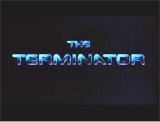


The Terminator (1984), 108 minutes, D: James Cameron
James Cameron's tech-noir, action-packed, low budget, beautifully-paced science-fiction film starred Arnold Schwarzenegger in his breakout role as an invulnerable, ruthless, assassin-terminator cyborg. The low-budget film grossed over $38 million (domestic), and made Schwarzenegger a star. His straight-faced and dead-panned "I'll be back" issued to a desk police clerk before he wasted the entire building, became a popular catch-phrase. After time-traveling from the post-apocalyptic, wasteland future of 2029 Los Angeles where a race of cyborgs ruled the world, the naked, fearsome and emotionless T-800 killing machine brutally murdered a group of young LA punks in the film's opening moments. He was in pursuit of innocent young Sarah Connor (Linda Hamilton) in the present-day world of 1984 - who was destined to bear a son. Her offspring, John Connor, would eventually become a liberator and lead the revolt against the evil machines to prevent the world from being annihilated. Rebel soldier Kyle Reece (Michael Biehn), a freedom-fighting soldier-hero also from the future, was on a mission to protect her, explain her destiny and the reason for the Terminator's relentless stalking (and he also became the 'father' of John Connor!). See Terminator series.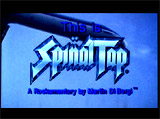




This Is Spinal Tap (1984), 82 minutes, D: Rob Reiner
One of the funniest, improvisational parodies and satirical mockumentaries ever made, a typical concert film about the ill-fated, 1982 Tap Across America tour by Spinal Tap - one of Europe's loudest bands, in their first US tour in six years. Fictional director Marty DiBergi (Rob Reiner, the film's actual director with his debut film) follows the members of the second-rate, fictitious heavy metal band as they promote their new LP album Smell the Glove: blonde lead singer David St. Hubbins (Michael McKean), the cucumber-wearing bass player Derek Smalls (Harry Shearer), lead guitarist Nigel Tufnel (Christopher Guest) - who seems to long for St. Hubbins, Viv Savage (David Kaff) - a strange troll-like keyboardist, and their shifty-eyed, cricket stick-wielding manager Ian Faith (Tony Hendra). There's also an endless string of mortal drummers (one is remembered as having choked to death on someone else's vomit, while another spontaneously combusted). The group has numerous tour misadventures: they can't find the amphitheatre stage for a performance in Cleveland, are stopped at security for wearing "artificial limbs," experience show cancellations, non-existent hotel accommodations, mechanical failures, second billing to a puppet show, an 18" Stonehenge props debacle, failed promotional appearances, and David's Yoko Ono-like girlfriend Jeanine Pettibone (June Chadwick) attempts to break up the band. The film's most famous scene is of Tufnel trying to explain how the band's Marshall amplifier is special: "These go to 11." The film features non-stop hilarity, mixing both obvious gags and lampooning in-jokes, as well as many brief star cameos, like Billy Crystal as angry head waiter Morty the Mime, Fran Drescher as tough record company publicist Bobbi Flekman ("Money talks, and bulls--t walks!"), Bruno Kirby as a limo driver, and Patrick MacNee as the vacuous Sir Denis Eton-Hogg, head of Polymer Records and Hoggwood, a camp for pale young boys.